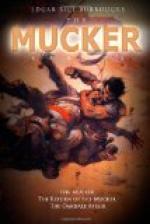“It was me that did it, though,” he said; “you can’t get away from that. It’ll always stick in your memory, so that you can never think of Mr. Mallory without thinking of the damned beast that murdered him—God! and I thought it smart!
“But you have no idea how I was raised, Miss Harding,” he went on. “Not that that’s any excuse for the thing I did; but it does make it seem a wonder that I ever could have made a start even at being decent. I never was well acquainted with any human being that wasn’t a thief, or a pickpocket, or a murderer—and they were all beasts, each in his own particular way, only they weren’t as decent as dumb beasts.
“I wasn’t as crafty as most of them, so I had to hold my own by brute force, and I did it; but, gad, how I accomplished it. The idea of fighting fair,” he laughed at the thought, “was utterly unknown to me. If I’d ever have tried it I’d have seen my finish in a hurry. No one fought fair in my gang, or in any other gang that I ever ran up against. It was an honor to kill a man, and if you accomplished it by kicking him to death when he was unconscious it detracted nothing from the glory of your exploit—it was what you did, not how you did it, that counted.
“I could have been decent, though, if I’d wanted to. Other fellows who were born and raised near me were decent enough. They got good jobs and stuck to them, and lived straight; but they made me sick—I looked down on them, and spent my time hanging around saloon corners rushing the can and insulting women—I didn’t want to be decent— not until I met you, and learned to—to,” he hesitated, stammering, and the red blood crept up his neck and across his face, “and learned to want your respect.”
It wasn’t what he had intended saying and the girl knew it. There sprang into her mind a sudden wish to hear Billy Byrne say the words that he had dared not say; but she promptly checked the desire, and a moment later a qualm of self-disgust came over her because of the weakness that had prompted her to entertain such a wish in connection with a person of this man’s station in life.
Days ran into weeks, and still the two remained upon their little island refuge. Byrne found first one excuse and then another to delay the march to the sea. He knew that it must be made sooner or later, and he knew, too, that its commencement would mark the beginning of the end of his association with Miss Harding, and that after that was ended life would be a dreary waste.
Either they would be picked up by a passing vessel or murdered by the natives, but in the latter event his separation from the woman he loved would be no more certain or absolute than in her return to her own people, for Billy Byrne knew that he “didn’t belong” in any society that knew Miss Barbara Harding, and he feared that once they had regained civilization there would be a return on the girl’s part to the old haughty aloofness, and that again he would be to her only a creature of a lower order, such as she and her kind addressed with a patronizing air as, “my man.”




